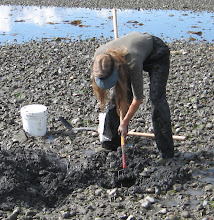Immigrant species aren't all bad - opinion - 25 September 2009 - New Scientist
Today's opinion piece online at New Scientist is an important critique of the "science" that is relied upon to support the herbiciding of every plant that is expanding its range in this time of global climate change. As Professor Davis, author of Invasion Biology, concludes
It is crucial that we distinguish harm from mere change so that we can spend scarce human and economic capital wisely.
Davis is quite clear that immigrant species have sometimes caused harm in their new homes, however he notes that that result is the exception rather than the rule. Here in southcentral Alaska, where the spruce/birch complex of "invasive" species have moved in to revegetate the moraines left behind by retreating glaciers over the last few thousand years, it is especially clear that change is natural and even desirable at times.
According to a review of Professor Davis's book Invasion Biology , first published in April,
"Davis writes well, and clearly. But his big contribution is to the skeptical re-examination of the field as a whole. This book will not kill it off. But if, over time, invasion biology were to become absorbed into broader ecological fields...future historians of science might see Invasion Biology as the beginning of the end."--Nature
Invasion Biology is available at: Amazon.com: Invasion Biology (Oxford Biology) (9780199218752): Mark A. Davis: Books
At the present time the Chugach National Forest, Kodiak National Wildlife Refuge, and Denali National Park are gearing up to start spraying herbicides to save Alaska from "invasive" plants such as dandelion, orange hawkweed, and butter-and-eggs. In addition the Alaska Department of Environmental Conservation is in the process of considering a railroad application to spray endocrine-disrupting herbicides on 90 miles of track between Seward and Indian.
Alaska is the only state that has a 25-year record of avoiding virtually all use of herbicides on our public lands and rights-of-way. Alaska is also the only state whose salmon runs and wildlife populations are relatively healthy. Alaskans need to take a hard look at those agencies whose solution to vegetation management problems is based in the herbiciding of Alaska.
Today's opinion piece online at New Scientist is an important critique of the "science" that is relied upon to support the herbiciding of every plant that is expanding its range in this time of global climate change. As Professor Davis, author of Invasion Biology, concludes
It is crucial that we distinguish harm from mere change so that we can spend scarce human and economic capital wisely.
Davis is quite clear that immigrant species have sometimes caused harm in their new homes, however he notes that that result is the exception rather than the rule. Here in southcentral Alaska, where the spruce/birch complex of "invasive" species have moved in to revegetate the moraines left behind by retreating glaciers over the last few thousand years, it is especially clear that change is natural and even desirable at times.
According to a review of Professor Davis's book Invasion Biology , first published in April,
"Davis writes well, and clearly. But his big contribution is to the skeptical re-examination of the field as a whole. This book will not kill it off. But if, over time, invasion biology were to become absorbed into broader ecological fields...future historians of science might see Invasion Biology as the beginning of the end."--Nature
Invasion Biology is available at: Amazon.com: Invasion Biology (Oxford Biology) (9780199218752): Mark A. Davis: Books
At the present time the Chugach National Forest, Kodiak National Wildlife Refuge, and Denali National Park are gearing up to start spraying herbicides to save Alaska from "invasive" plants such as dandelion, orange hawkweed, and butter-and-eggs. In addition the Alaska Department of Environmental Conservation is in the process of considering a railroad application to spray endocrine-disrupting herbicides on 90 miles of track between Seward and Indian.
Alaska is the only state that has a 25-year record of avoiding virtually all use of herbicides on our public lands and rights-of-way. Alaska is also the only state whose salmon runs and wildlife populations are relatively healthy. Alaskans need to take a hard look at those agencies whose solution to vegetation management problems is based in the herbiciding of Alaska.






